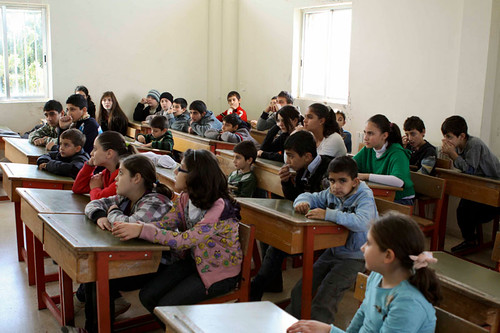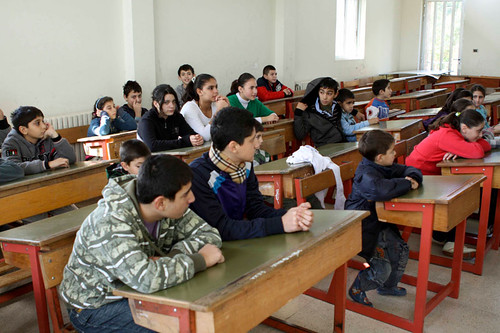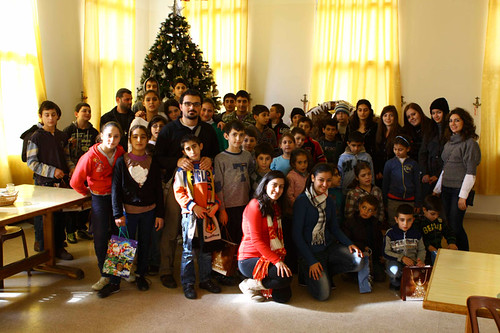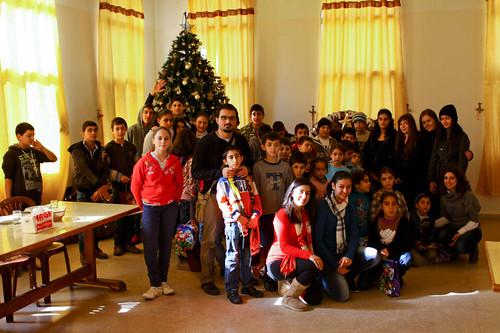On Friday, November 25, 2011, a lecture on “Religious and Cultural Diversity in Europe: New Challenges for the Study of Religions” was held in the auditorium, for the Haigazian University Cultural Hour.
Dr. Arda Ekmekji, Dean of the Faculty of Arts and Science, welcomed the guests and introduced the topic at hand, discussing how Europe has changed in the last century in terms of ethnic and religious diversity.

To provide his suggestions for this interesting challenge, Dr. Wolfman Reiss, a professor of theology from the University of Vienna, was invited to come to the podium.
Reiss began his lecture by describing the two traditional approaches to the study of religion, namely studying the history of religion and the systematic comparative studies of religions. He then traced the changes in religious study in the 20th century, how the focus was moved from the historical approach to a comparative one and more recently with the added dimension of social and political topics.

Reiss then expanded on the role that religious scholars have in contemporary society, providing research to help elucidate actual on-the-ground issues that Europeans face today. An example he provided is the increasing number of Muslim children in Austrian kindergartens, which reaches up to 40 percent in some areas. “To provide the state with an appropriate basis for decisions, information is needed,” stressed Reiss.
In light of this need, Reiss proposed an application-oriented study of religion that “dedicates itself to contemporary societal, political problems of our time.”As a study, it can serve society by giving advice, while leaving the actual decision-making up to the politicians and the lawmakers.
Reiss then proceeded to outline the implementation of such a study, using his own execution of it at the University of Vienna as an illustration. Among other things, he warned that such students “have to preserve the highest level of impartiality in their study.”

Reiss also mentioned some criticism of this application-oriented approach, citing some of his contemporaries in the field. He then concluded by sharing some of the research that has been done in Vienna, as well as future projects such as an excursion to Egypt next year to investigate the Coptic Christian situation.
The lecture was followed by a long Q&A session and ended with refreshments served in the Mugar Hall.
Dr. Arda Ekmekji, Dean of the Faculty of Arts and Science, welcomed the guests and introduced the topic at hand, discussing how Europe has changed in the last century in terms of ethnic and religious diversity.

To provide his suggestions for this interesting challenge, Dr. Wolfman Reiss, a professor of theology from the University of Vienna, was invited to come to the podium.
Reiss began his lecture by describing the two traditional approaches to the study of religion, namely studying the history of religion and the systematic comparative studies of religions. He then traced the changes in religious study in the 20th century, how the focus was moved from the historical approach to a comparative one and more recently with the added dimension of social and political topics.

Reiss then expanded on the role that religious scholars have in contemporary society, providing research to help elucidate actual on-the-ground issues that Europeans face today. An example he provided is the increasing number of Muslim children in Austrian kindergartens, which reaches up to 40 percent in some areas. “To provide the state with an appropriate basis for decisions, information is needed,” stressed Reiss.
In light of this need, Reiss proposed an application-oriented study of religion that “dedicates itself to contemporary societal, political problems of our time.”As a study, it can serve society by giving advice, while leaving the actual decision-making up to the politicians and the lawmakers.
Reiss then proceeded to outline the implementation of such a study, using his own execution of it at the University of Vienna as an illustration. Among other things, he warned that such students “have to preserve the highest level of impartiality in their study.”

Reiss also mentioned some criticism of this application-oriented approach, citing some of his contemporaries in the field. He then concluded by sharing some of the research that has been done in Vienna, as well as future projects such as an excursion to Egypt next year to investigate the Coptic Christian situation.
The lecture was followed by a long Q&A session and ended with refreshments served in the Mugar Hall.






































































